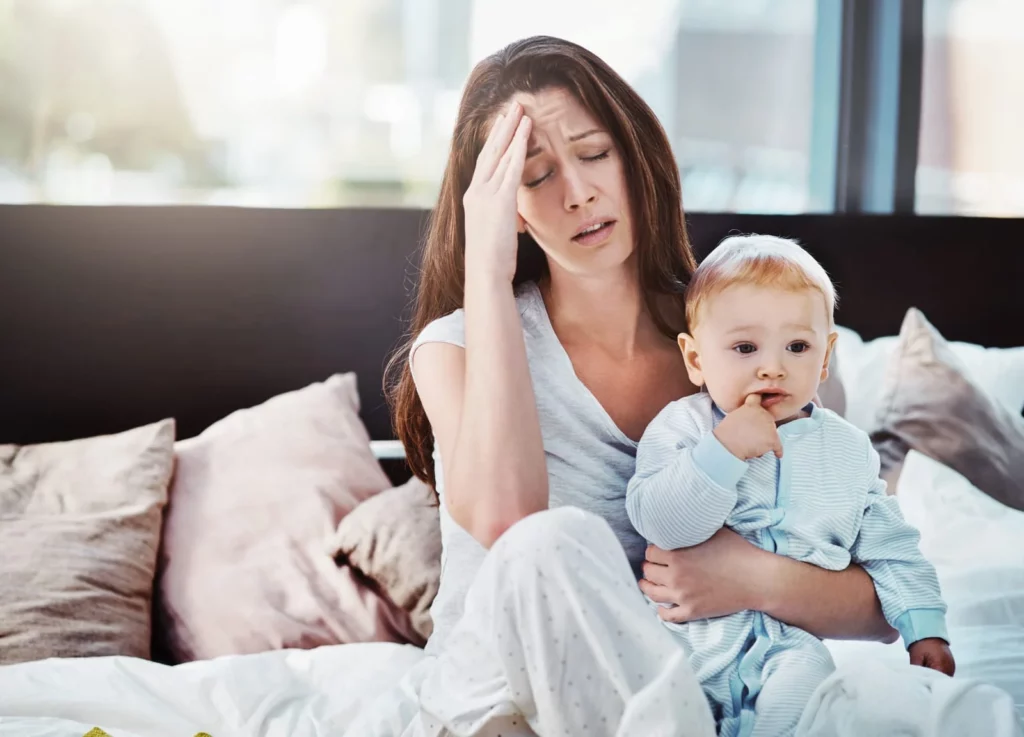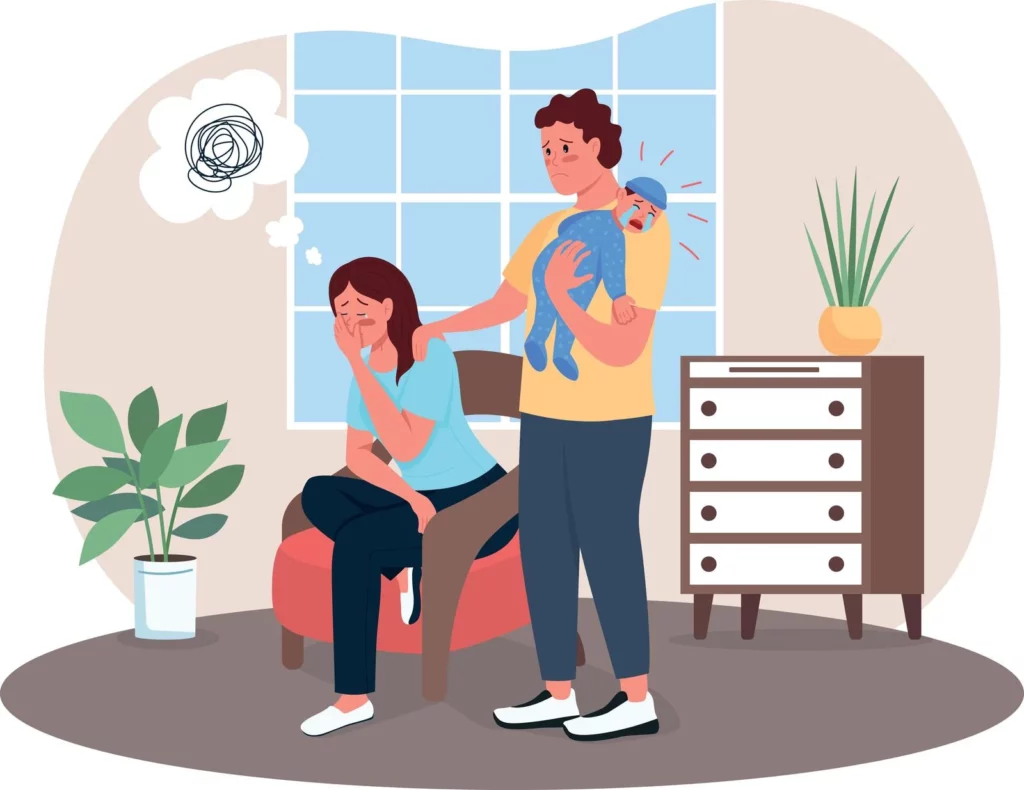Announcement
This article will offer an in-depth and compassionate guide for new mothers and their support networks on distinguishing between baby blues and postpartum depression, emphasizing the importance of early identification, understanding of symptoms, and pathways to effective treatment and support.
Introduction
Becoming a mother is always full of excitement, joy, stress, mood swings, and sometimes, depression. Many moms, especially new mothers, start to experience sadness right after birth, something referred to as “baby blues.”
Baby blues are a normal response to the immediate change in hormones and estrogen that follow giving birth. It’s important to understand the differences between baby blues vs postpartum depression as well as the symptoms for postpartum depression vs blues because baby blues go away on their own and don’t have as many complicated causes. As such, there’s often no need for treatment, but postpartum is very serious and absolutely needs treatment.
This article will cover the difference between baby blues vs postpartum depression, particularly in light of the duration, timing of symptoms, severity of symptoms, impact on daily function, and treatment options.

Baby blues or postpartum depression: why you need to know the difference
Why is it important to know the difference between baby blues and postpartum depression? For several reasons. For starters, Baby Blues are regular feelings of sadness that affect an average of 80% of moms regardless of education, income, race, or any other characteristic. The symptoms go away on their own, and they don’t require treatment.
However, postpartum depression is very serious, and the symptoms do require treatment. Moreover, if left untreated, postpartum depression can significantly interfere with emotional attachment to a new child, which can hinder development and growth.
Baby blues vs. postpartum depression
Baby blues happen because of sudden decreases in progesterone and estrogen after delivery. This can cause mood swings, exhaustion, even depression. There are co-occurring emotional issues like anxiety about caring for a new baby or stress at home as well.
Postpartum depression can be caused by the same dramatic decrease in hormones, but there are several other risk factors that can increase the development of postpartum depression, like anxiety, a history of depression, or postpartum insomnia.
Duration and timing of symptoms
One difference between postpartum blues and postpartum depression is that symptoms of baby blues tend to manifest within 3-5 days from when a child is born.
Another difference between baby blues and postpartum depression is how long the symptoms last. With baby blues, symptoms tend to go away after a couple of weeks, but with postpartum depression, symptoms can last for several months or years if left untreated.
With postpartum blues vs depression, the timing of symptoms and duration are essential qualities to understand. Postpartum depression can start within a few weeks or up to 6 months after childbirth.
Moreover, postpartum depression symptoms can last for years, and they won’t go away on their own.
Symptoms and severity of symptoms
How do postpartum blues and postpartum depression differ in symptoms?
Baby blues tend to have symptoms like:
- Sadness
- Crying
- Restlessness
- Feeling overwhelmed
- Anxiety
- Irritability
All of these symptoms are related to a lot of the stress and responsibility that’s associated with suddenly having a newborn to care for.
Postpartum depression has more severe symptoms, many of which mirror major depressive disorder, including:
- Extreme stress
- Detachment from the new baby
- Fear of being alone
- Feeling overwhelming panic or guilt
- Crying a lot
- Feeling like you aren’t good enough
- Difficulty focusing
- Having scary thoughts about yourself or your child

Impact on daily functioning
With postpartum depression vs blues, there is a difference in terms of the impact the condition has on daily function. Baby blues might cause you to feel tired, but you still connect with your child and take care of them. Baby blues can also cause the feeling that you’re not quite yourself, which can leave you irritable or stressed.
With baby blues, they will go away on their own, but there are some things you can do to help yourself feel better. For example:
- Even though you have a new baby, ask someone you trust to watch them, even if just for a few minutes each day, so you can get some sun or a shower or otherwise take time to yourself.
- Find a support group of some kind or connect with other new parents so that you can address concerns you might have together.
- Exercise to help reduce your stress, avoid alcohol, and eat healthy foods.
- Ask for help from your family or your partner, like running errands for you or watching the baby while you take a nap. Getting as much sleep as you can is imperative during this time, especially because postpartum insomnia can lead to postpartum depression.
However, postpartum depression symptoms can have a much more severe impact on daily function. Symptoms are often so severe it can make it difficult for you to do everyday chores or even get out of bed, let alone take care of your child. It can also manifest in terms of thoughts about harming yourself or your child.
Diagnosis and assessment
If you are trying to figure out whether you have baby blues or postpartum depression, the first thing you can do is self-assess.
- Firstly, take note of when the symptoms started. Don’t be afraid to ask your partner if they recall when the symptoms started. Symptoms don’t normally start until at least a few weeks after you’ve given birth for postpartum depression, but they might not appear until a few months after you have given birth.
- Secondly, try to keep track of how long symptoms last. If you are worried about whether you have baby blues or postpartum depression, wait a few weeks after you’ve given birth to see if the symptoms subside. Baby blues will naturally go away within a couple of weeks, no longer.
If your symptoms persist long after two weeks from the time you’ve given birth, you should consider getting a professional diagnosis and treatment. Crying for no reason, not feeling like yourself, or being impatient are minor emotional issues that are a natural part of pregnancy and childbirth, but if you feel completely hopeless, you can’t control your crying, and you are having frightening thoughts about yourself or your child, including thoughts of harm, you should absolutely reach out for help immediately.

Getting treatment
If you are worried about yourself or your baby, having frightening thoughts, or struggling with what you think is postpartum depression, you should absolutely get help as soon as possible. There is nothing wrong with you, and there is no shame in reaching out. But postpartum depression can have serious ramifications, and it needs treatment in order to get better. Unlike baby blues, postpartum depression does not get better on its own.
Summing Up
With baby blues vs postpartum depression, it’s important to distinguish between the two conditions. The more you know about key differences like the onset, duration, and severity of symptoms, the easier it will be for you to recognize when it’s time to get help. Treatment and management of baby blues is relatively simple. It will go away on its own over the first couple of weeks, but treatment for postpartum depression requires medical intervention.
So, if you are struggling with postpartum depression, don’t be afraid to seek help and support so that you can find the right treatment and resources.